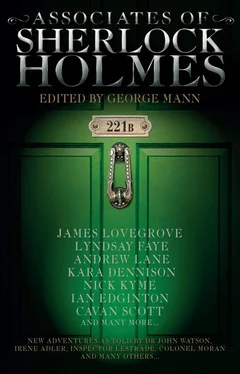I watched the gulls whirl in the sky above the ancient buttresses, convincing myself that yes, that’s exactly what I would have done.
And Holmes was right. Now I had to start again, to build another nest, far away, where no one would find me again. It was time to take another name.
The gulls shrieked, twisting in the air before swooping away. I watched them go, barely noticing the man who came to sit alongside me on the bench. He regarded the cathedral for a moment, before rising to walk back the way he came. I waited, counting to ten, before dropping my gloved hand down to the envelope he had left behind.
Opening the flap, I removed the photographs that I had ordered – Dr John Watson sat in the bowels of the cabaret, his hand on the arm of a handsome young man, their faces surprisingly close, lips inches away from each other. Then there were the images of the good doctor handing over a wad of notes to a scantily clad girl. You couldn’t see her face, but Watson’s profile was clear for all to see.
Certain editors on Fleet Street would pay good money for such shots. Think of the papers they would sell. Think of the headlines. Give the people what they want, and all that.
My words of yesterday came back unbidden.
I have never demanded so much as a penny for my silence, never acting in spite or retaliation.
I slipped the photographs safely back into the envelope and smiled. If I sent them, I would not ask for recompense. Instead, copies would land anonymously on every news desk in the land.
If I sent them.
I rose from the bench and strolled along the banks of the river. Interesting times lay ahead for Dr Watson, and I wished him well.
After all, whatever threats Sherlock Holmes made, to me, John Watson would always be the man.
THE CASE OF THE HAPHAZARD MARKSMAN
Andrew Lane
Langdale Pikenever appears in the canon, although he is mentioned in “The Adventure of the Three Gables”. He is described as being “strange” and “languid” (a condition I have aspired to ever since I was a teenager) and he apparently makes a living as a gossip columnist. He does actually turn up in the 1980s TV adaptation starring Jeremy Brett as Holmes, played memorably by the excellent Peter Wyngarde. It is Wyngarde who I imagined when I was writing this story.
—Andrew Lane
My name is Langdale Pike. You have probably heard of me. In fact, I would be surprised if you had not. I write what are popularly known as “gossip columns” for several of the more popular newspapers and magazines available in this, the greatest city in the greatest nation of the world. From the centre of my web of information I pick up on the slightest of vibrations in strands that extend into the servants’ quarters of every large house, into the snugs and taprooms of every tavern and bar, into the fronts-of-house of every theatre and music hall of note and into the comfortable seating of every café and coffee house. Or, to put it more prosaically, from my preferred window seat in my club in St. James’s I have a network of runners who perpetually shuttle snippets of information from maids, footmen, attendants and serving girls into my hands and, subsequently, small sums of money from me back to them. There is no assignation, no affair, no gambling debt and no underhand activity of which I am ignorant – if, that is, the public would find it titillating. If not, you need have no fear. If your fumbled indiscretion with your wife’s sister or your surreptitious channelling of church funds into your own pocket would not sell a few more newspapers were it to be reported in the press then, rest assured, I am not interested. Go, as they say, and sin in peace.
Gossip is, I am convinced, one of the basic drives of humanity. Without gossip what would we have to talk about over the garden wall or across the dinner table? Only the weather, and given London’s dismal record in that regard the conversation would soon peter out. We all have a burning desire to know what members of the aristocracy, royalty, the Church and the House of Commons get up to behind closed doors. I am merely fulfilling a public service by collating and disseminating these details.
Contrary to certain canards that have been spread around about me recently, I do not, I promise you, blackmail people using the information I have about them. Blackmail is an appalling crime, and I am a law-abiding citizen. I have never taken a single shilling to suppress details of a scandal, but I have taken many shillings in the service of getting those details in front of a voracious public. These wicked slurs have, I am sure, been spread by some who have been hurt by the – to them, uncomfortable – truths I tell in print. I understand that their marriages may have been destroyed and that they may be facing financial ruin, but to them I would say that their travails are a result of their own peccadilloes. If they had not lapsed, they would not have lost so much.
Not only do I not profit from the vile trade of blackmail: my services are, in fact, taken advantage of by various guardians of law and order in London – the police, and the increasing number of consulting detectives setting up shop in Paddington and Pimlico. It is often crucial to their investigations to know that this suspect has been having a torrid love affair with that maid and that his recently murdered wife had, just prior to her death, discovered them locked in an amorous embrace. In the interests of telling the complete truth I have also, I admit, been approached by those who labour at the other end of the spectrum of legality. They, of course, do not share my repugnance at blackmail. I try my best not to get involved with these insalubrious characters. We have something of an armed standoff – I know the details of their dirty little schemes and could expose them to the police if I so chose. In fact, I have collections of information lodged with several solicitors scattered around London like so many infernal devices. If anything were to happen to me then that information would be released, and for a while the streets would be a great deal cleaner. But only for a while.
The only exception I make in this regard is a certain, shall we say, academic gentleman who occasionally seeks out my services. He is the kind of man whose mild requests have the force of barked orders, and unpleasant things happen to those who ignore those requests. Fortunately, he regards blackmail as trivial and beneath his intellect. The information with which I provide him is used in other ways that I rarely get to see. He also invites me for lunch every now and then at his club. He is a surprisingly pleasant conversationalist.
Talking of this gentleman brings me in a circle, back to the consulting detectives who seek me out and pay me for information. One in particular – a Mr Sherlock Holmes – frequently takes advantage of my services. He does not approve of me, but I am well past the time in my life when I require anybody’s approval. He finds me useful, however, and it does amuse me to see the daemons of his practical side fighting with the angels of his better nature. The poor man does suffer so.
I keep up to date with the cases undertaken by Mr Holmes by reading the accounts written by his fellow lodger and amanuensis, Dr John Watson. Often I can see within those accounts elements that I provided to Holmes but that he has, I presume, failed to explain properly to Dr Watson – preferring instead to take the credit for discovering them himself. And, who, frankly, can blame him? I trust, by the way, that Dr Watson’s skills as a physician exceed those he displays as a writer of prose. Or perhaps I am just irritated by the way his lumpen phraseology seems to catch the public imagination. Those of us who make a professional living from journalism tend to look darkly upon the fortunate amateur.
Читать дальше












